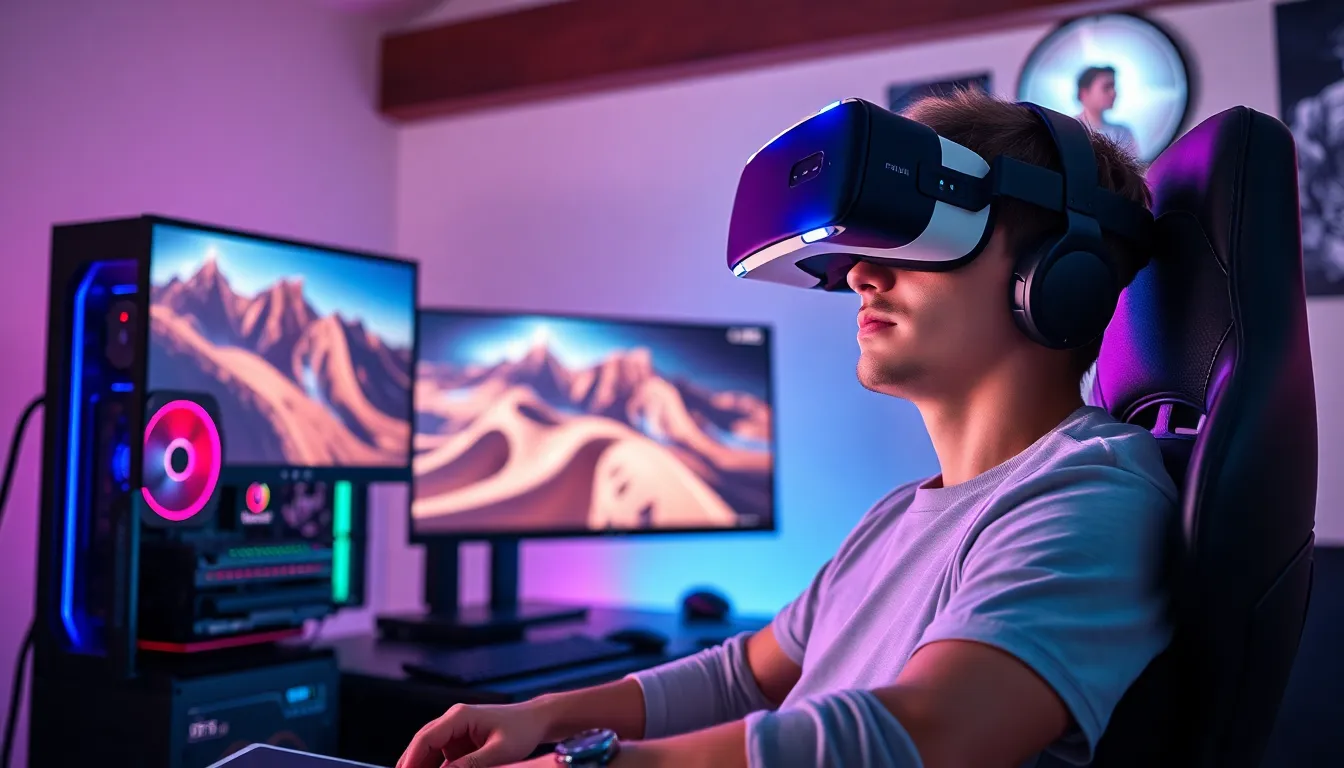Phone:
(701)814-6992
Physical address:
6296 Donnelly Plaza
Ratkeville, Bahamas.

In a world where gaming has transcended the ordinary, stepping into a virtual reality realm is no longer just a dream—it’s a thrilling reality waiting to be explored. But before diving headfirst into those pixelated adventures, one crucial question looms: is your gaming PC VR-ready? If it’s struggling to keep up with your favorite titles, you might find yourself in a virtual world that feels more like a pixelated nightmare.
A VR-ready gaming PC refers to a desktop computer designed to provide an optimal experience for virtual reality applications. These systems meet specific requirements that ensure smooth gameplay and immersive environments. High-performance hardware components play a crucial role in achieving this level of performance.
Graphics cards significantly impact VR performance. Many VR-ready PCs feature advanced GPUs, like NVIDIA GeForce RTX 3070 or AMD Radeon RX 6800. Such GPUs render high-quality visuals, reducing lag and increasing responsiveness.
Processor capabilities also matter. A powerful CPU, such as an Intel Core i5 or an AMD Ryzen 5, ensures that the system can handle multiple tasks simultaneously. This ability prevents stuttering during gameplay, which is vital in fast-paced VR environments.
Memory capacity is another important factor. A minimum of 16GB RAM is recommended for VR gaming. Sufficient RAM allows for seamless multitasking and improved load times, enhancing the overall gaming experience.
Storage solutions contribute to performance as well. SSDs are preferred over HDDs, as they offer faster load times and reduced latency. A VR-ready PC typically features at least 512GB of SSD storage to accommodate large game files and software.
Lastly, connectivity options enrich the VR experience. A VR-ready gaming PC should include multiple USB 3.0 ports for devices like motion controllers and sensors. These ports ensure that all components work together efficiently, providing an uninterrupted immersive experience.
Understanding these key elements helps in selecting a suitable VR-ready gaming PC, paving the way for an engaging virtual reality adventure.

Understanding the key components of a VR-ready gaming PC is vital for an effective setup. Each component plays a crucial role in delivering a smooth virtual reality experience.
A powerful graphics card is essential for rendering high-quality visuals in VR environments. Modern options like the NVIDIA GeForce RTX 3070 and AMD Radeon RX 6800 provide exceptional performance, ensuring graphics render smoothly without lag. These graphics cards support ray tracing and offer high frame rates, both critical for immersive gameplay. Meeting the recommended specifications within these models enhances visual quality and responsiveness, vital for a thrilling VR experience.
An efficient processor manages the complex tasks required during gameplay. Intel Core i5 and AMD Ryzen 5 serve as industry benchmarks that meet VR requirements effectively. Both facilitate seamless multitasking without stutters or delays, essential in resource-heavy VR applications. Selecting a CPU capable of handling these demands ensures that players experience consistent performance, allowing them to fully engage in virtual adventures without technical interruptions.
Memory and storage solutions significantly influence a VR gaming setup’s responsiveness. A minimum of 16GB RAM is necessary for smooth multitasking and quick load times. Likewise, SSDs provide faster data access than traditional HDDs, making them the preferred choice. A capacity of at least 512GB SSD ensures ample space for games and applications, while reducing latency improves overall performance. Investing in these components enhances engagement in virtual reality environments, retaining player immersion.
Owning a VR-ready gaming PC maximizes virtual reality experiences and elevates overall gaming enjoyment. The following benefits highlight the advantages of such a system.
An immersive gaming experience offers thrilling engagement in virtual worlds. Players encounter stunning visuals through advanced graphics cards. Enhanced frame rates lead to smoother gameplay, allowing for real-time interactions. High-quality audio complements the visuals, creating an enveloping environment. Gamers experience environments that feel real, increasing excitement and investment in gameplay. Immersive components of VR-ready systems make the difference in maintaining a high level of realism.
Compatibility with VR headsets plays a critical role in leveraging virtual reality capabilities. Many VR headsets, including the Oculus Rift and HTC Vive, require specific hardware for optimal performance. A VR-ready gaming PC meets or exceeds these hardware requirements seamlessly. Users enjoy plug-and-play convenience with versatile connectivity options, ensuring that all devices function correctly. Enhanced support for multiple headsets means players can switch devices without compromising performance. Compatibility drives engagement, making it easier for gamers to access a diverse range of VR titles.
Selecting a VR-ready gaming PC requires attention to specific components for optimal performance. Advanced graphics cards dominate the selection criteria. Options like the NVIDIA GeForce RTX 3070 or AMD Radeon RX 6800 significantly enhance visual fidelity, making immersive experiences possible.
Beyond graphics, a powerful CPU matters. Intel Core i5 or AMD Ryzen 5 processors handle multitasking effortlessly. These processors prevent stuttering during gameplay, allowing smooth transitions between VR elements.
Memory capacity also plays a vital role. At least 16GB of RAM is essential for seamless multitasking. This amount ensures applications run efficiently, further enhancing gameplay experience.
Storage solutions should favor SSDs over traditional HDDs. A minimum of 512GB SSD storage provides faster load times. Faster storage reduces latency, crucial for maintaining immersion in virtual environments.
Connectivity options are not to be overlooked. Multiple USB 3.0 ports facilitate the connection of motion controllers and sensors. This variety maintains an uninterrupted VR experience, enabling players to engage fully without technical interruptions.
Prioritize system compatibility with VR headsets. Most VR-ready PCs meet or exceed requirements set by popular devices like the Oculus Rift and HTC Vive. Seamless plug-and-play functionality fosters convenience and broad access to diverse VR titles.
Maintaining a focus on these crucial specifications leads to enhanced engagement in virtual reality adventures. Proper selection of components makes a difference in overall gaming enjoyment and satisfaction.
Investing in a VR-ready gaming PC opens the door to unparalleled virtual reality experiences. With the right hardware specifications players can enjoy immersive environments and seamless gameplay. A powerful graphics card and efficient CPU are essential for rendering high-quality visuals and handling multiple tasks without lag.
Moreover adequate RAM and SSD storage enhance responsiveness ensuring players can dive into their favorite VR titles without interruptions. Compatibility with popular VR headsets further enriches the experience allowing for easy access to a wide range of games. By prioritizing these components gamers can elevate their virtual adventures to new heights.